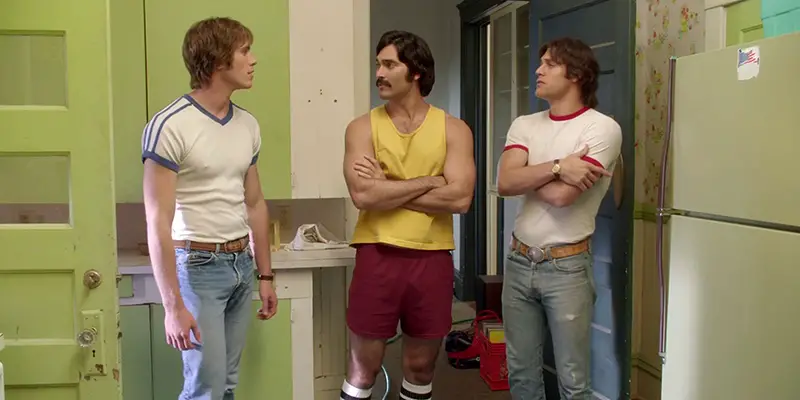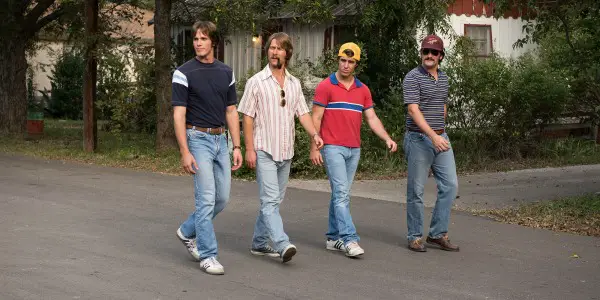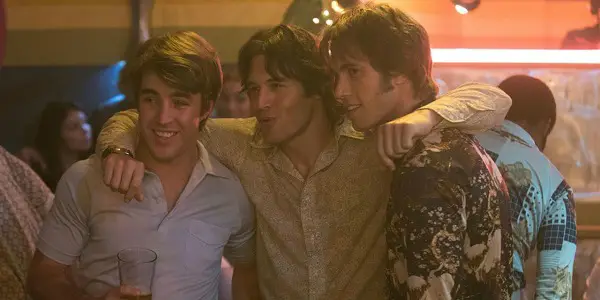EVERYBODY WANTS SOME!!: The Emotionally Empty Cousin to Dazed & Confused

Alistair is a 25 year old writer based in Cambridge.…
Richard Linklater may be the definitive coming-of-age filmmaker of our time, effortlessly blending John Hughes indebted stories of young people coming to grips with their own identities, with an Altman-esque ear for naturalistic dialogue. His films feel timeless, yet completely of their time – snapshots of a generation that will remain beloved when the next generation of cinephiles lay their eyes on them.
A “Spiritual Sequel”
His latest film, the punctuation-friendly Everybody Wants Some!!, is billed as a spiritual sequel to his 1993 breakout feature Dazed and Confused. Although the characters and time periods don’t fully overlap (there is a four year period between the action in both films), the story seems to be a continuation of that of Randall “Pink” Floyd. Jason London’s character ended Dazed seemingly uninterested in his football scholarship and preferring to drive down the infinite highway of young life with his friends.

Everybody Wants Some opens on that same infinite highway, only this time the lack of destination of young adulthood is replaced with a concrete career path for our unrelated protagonist Jake (Blake Jenner), a college baseball player driving to his future alma mater for the first time. The clear decision to effectively pick up where the previous story left off (though the original character played football) means it is jarring at first to realise that Linklater has instead concocted a whole bunch of new characters. This isn’t quite as jarring as the decision on his part to focus entirely on the baseball team, a set of jocks who at one point sum up their lives as revolving entirely around “pussy and baseball”.
With Dazed and Confused, Linklater gave a humanist eye to every different social group in the high school pecking order, from the jocks to the nerds. Here, his empathetic approach is extended solely to the vaguely misogynistic popular guys. If you weren’t a heterosexual, popular guy in high school or college, it is unlikely you will be able to forge a similar emotional connection to this as in Linklater’s previous films. When we do see other social groups in the film, including punks, to name one of the many period-examples presented, we see them through the eyes of our jock protagonists, distancing the audience from the likelihood of relating to them as anything other than caricatures. They are merely novelty items from the period, whilst the jock characters are so broad they bare equal resemblance to how similar characters would act in a contemporary setting.
One of the thematic elements in the film is about how young people are constantly in search of an identity to define them, and how pop-culture is constantly the thing responsible for it. But it frequently goes underdeveloped, not providing the rich examination of young adulthood that Dazed or Boyhood delivered effortlessly. Even Linklater’s returning thematic obsession of the passage of time, explored so magnificently in Boyhood and the Before trilogy, doesn’t feel as strong this time around – if only because the characters are either unappealing or uninteresting.
Not Getting Under the Skin of the Period
When Jake reveals himself to be a sensitive soul of the traditional Linklater variety, he embarks on a date with a theatre student (Zoey Deutch), and they share real-time conversations that feel like diminishing returns of his triptych masterpieces. It is a bizarre case of a filmmaker who after very clearly letting their hair down and making a straight comedy, decides to backload the film with his more arthouse friendly narrative techniques, that don’t feel of a piece with the aimless nonsense that came before.

Even the period setting doesn’t feel lovingly invoked. Sure, it feels authentic in the sense that the characters aren’t making constant pop-culture gags underlining the time period – although both this and Dazed share Gilligan’s Island references. But in terms of the soundtrack, it feels as authentic as tuning into an oldies radio station; My Sharona, Heart of Glass, Every 1’s a Winner – the songs are all overplayed staples to this day, their inclusion helping to only underline that Linklater isn’t truly getting under the skin of this period.
This isn’t to say these are bad songs, but they are uninspired choices. Admittedly, the song choices in Dazed weren’t exactly “deep cuts”, but they felt authentic to the characters’ personalities. Here, with the exception of a joyful rendition of Rapper’s Delight in the opening minutes and references to Pink Floyd, songs just feel included at random, not feeling like representations of what these characters would truly be listening to. With music being one of Linklater’s pet obsessions, minute details like this truly matter when assessing his work.
Luckily, these criticisms all fade in the background in several sequences; because the film is often so funny you choose to look past it. The film contains some of the dumbest, broadest humour Linklater has ever been responsible for, but it feels more representative of these characters than the last-minute attempts to forge them out as sensitive souls. Some of the jokes do play on the bizarre combination of homophobia and homosexual-friendly gags that are so inherent in US dude-culture, without ever belittling the characters’ occasionally offensive points of view. Instead of feeling retroactively fresh like Linklater’s other period works, it just feels like a product of its time that has only been made now. But even with all these criticisms, when Everybody Wants Some is funny, it is REALLY funny.
Conclusion
A minor work from a major filmmaker disguising itself as the heir to one of his most beloved films, Everybody Wants Some is nothing more than Dazed and Confused’s empty cousin. It has the jokes, but not the heart to truly make this as special as it needs to be.
What are the best depictions of the ’80s in modern movies?
Everybody Wants Some is out now in the US and on May 13 in the UK. All international release dates are here.
Does content like this matter to you?
Become a Member and support film journalism. Unlock access to all of Film Inquiry`s great articles. Join a community of like-minded readers who are passionate about cinema - get access to our private members Network, give back to independent filmmakers, and more.
Alistair is a 25 year old writer based in Cambridge. He has been writing about film since the start of 2014, and in addition to Film Inquiry, regularly contributes to Gay Essential and The Digital Fix, with additional bylines in Film Stories, the BFI and Vague Visages. Because of his work for Film Inquiry, he is a recognised member of GALECA, the Gay & Lesbian Entertainment Critics' Association.













